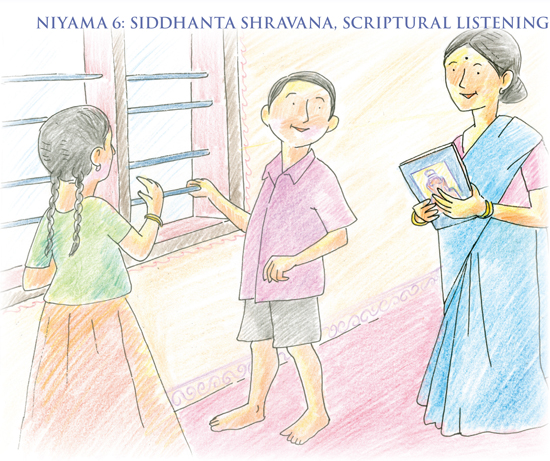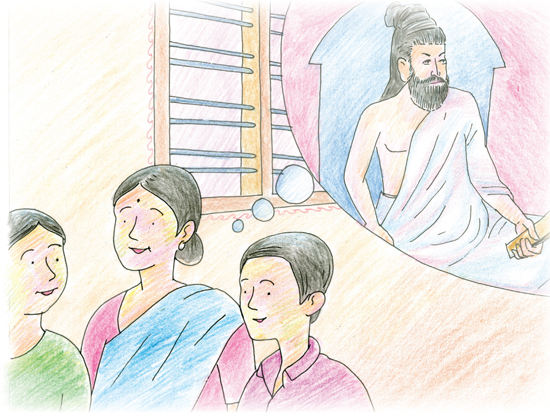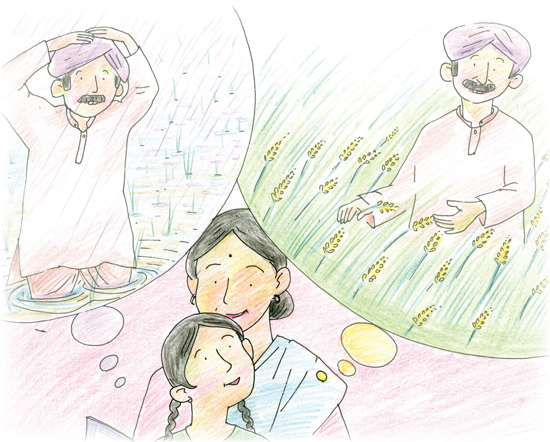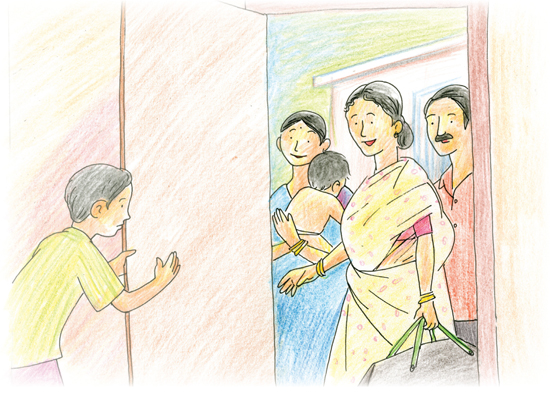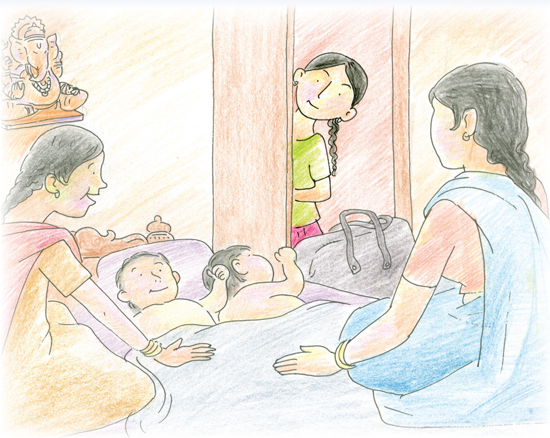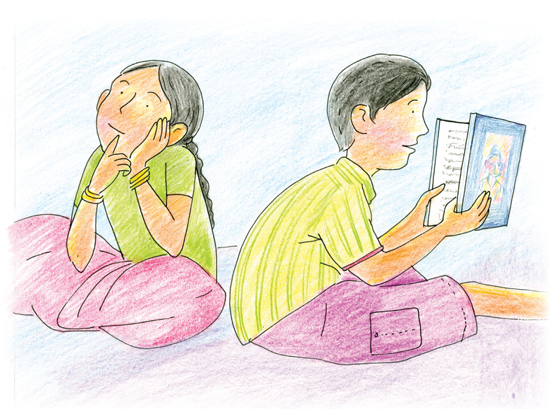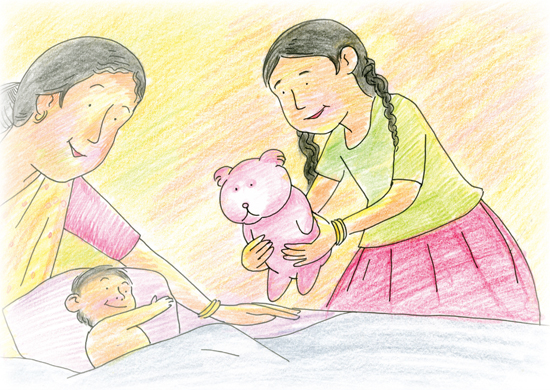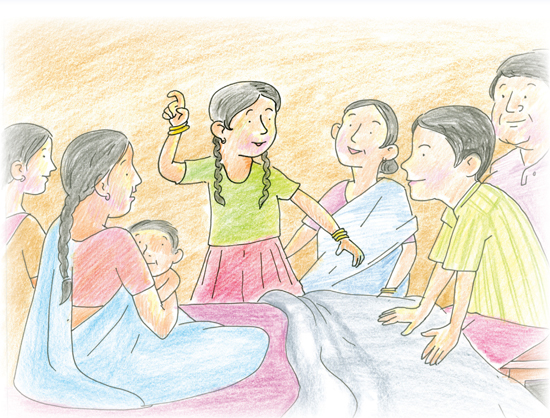Treating Guests as God
Seyon declared loudly, “I’m bored!” “Me, too,” replied Valli, his usually cheerful ten-year-old sister. “This silly rain, choosing to come during our school vacation! I can’t go outside, and there is nothing to do inside!”§
“You have more to do than me! You have your puzzles and your dolls!” said Seyon.§
“You have your video games,” shot back Valli.§
“Yes, but I don’t have any new games, and I’m bored,” he said.§
Amma watched the two of them complaining. “I have an idea,” she said. “We will do a project together as a family, and we’ll treat ourselves when it’s finished!”§
“That sounds like fun! What’s the project? Painting?” Valli asked excitedly.§
“Painting? That’s lame!” Seyon smirked.§
Amma answered, “This is only for smart children. You have to learn something by heart.”§
“Like a poem?” asked Valli.§
“Not a whole poem, but several couplets.”§
“What’s a couplet?”§
“A couplet is a verse with two lines,” replied Amma with a smile.§
Seyon perked up, “I like it. I can learn one of those in half a second.”§
“There is a catch,” Amma grinned. “There are 1,330 couplets. The project is to learn as many as possible as a family.”§
“I don’t think I like this game,” Valli complained. “Seyon is going to learn more.” The family avoided competitive games, but still the winners and losers spirit sometimes arose.§
“Now, now!” said Amma, “You will both do fine. You can learn as many as you want. Here is a fair way we can manage the game. Each of you will be given one week to learn as many couplets as you can. At the end of the week, we will add up the number of couplets you have learned and we will convert that number into money, and...” She paused, then added with a smile, “Then we’ll go out together and spend the money on a special dinner! How do you like that idea?”§
“It sounds great!” said Seyon, who loved outings. “Now where are these couplets?”§
“You have heard me talk about them many times. They are in the Tirukural, a book written by Saint Tiruvalluvar 2,000 years ago. It is the most popular Tamil classic of all times. As you know, the author gives wise advice on all sorts of subjects, including religion, farming, friendship, even how to manage an army.”§
“What’s the point in learning the verses by heart?” asked Valli.§
“Nothing or everything!” replied Amma. “If you merely learn them by heart without understanding their meaning, it is nothing. However, it is everything if you memorize the words and truly understand the meaning. Then you will have gained a great treasure of knowledge.”§
Seyon frowned. “A week to memorize 1,330 couplets?”§
“We are not trying to memorize them all right away!” Amma clarified.§
“Well, we certainly don’t have anything else to do. We might as well start learning them,” Seyon grumbled.§
Amma gave them each a hardbound copy of the Tirukural and returned to her housework.§
Seyon read the first verse in its English translation: “A is the first and source of all the letters. Even so is God Primordial the first and source of the entire world.” He paged through the dictonary for primordial and read the meaning outloud: “existing from the beginning of time.”§
Amma came over and explained the verse, “The sound ‘A’ is the first sound in the Tamil alphabet, and all other sounds come out of it. Saint Valluvar is telling us that just as ‘A’ comes first, so does God. And just as the whole alphabet comes from ‘A,’ so does the whole world come from God.”§
Seyon grinned and continued eagerly through chapter one. Soon he had memorized all ten verses in English. “Not so hard,” he thought.§
Over the next week, the rains beat down without a break. Sheets of slate grey water pooled on the sidewalks. It was impossible to go out and play. With nothing else to do, the children spent hours and hours with their books.§
Valli struggled with the project. The couplets were not simple or easy, and the rule was you had to understand them as well as memorize them. She slowly read through the first ten verses, though she couldn’t really say she knew them by heart. But she started chapter two anyway. She smiled as she read its first verse, “It is rain that ruins, and it is rain again that raises up those it has ruined.” “Well,” she murmered, “Rain is certainly ruining our vacation time, but I don’t see how it’s going to raise anything up!”§
She ran to Amma, “What does this mean?”§
Amma said, “Oh, that’s one of my favorites. Remember, we are talking about the old days when everyone farmed. Once in a great while, a heavy rain would flood all the fields and ruin the farmer’s crops. But the flooding also left behind rich silt that made the fields more fertile. And gentler rains would later nourish new crops. So, the farmer’s crops were ruined by rain, but later the crops were made abundant again by rain. Rain was the key to feeding everyone in those days. That’s the idea.”§
“I get it!” Valli shouted. “I hope our rain will have a surprise for us!”§
The children continued studying and memorizing, and both looked forward to Sunday, when the game would end. They found the couplets interesting, and some even made them laugh. But Seyon and Valli weren’t yet thinking how the verses might apply to their life— except for that one on rain and how it was ruining their vacation.§
On Sunday morning, just as the family sat down for breakfast, the doorbell rang. Seyon ran and opened it. Though he knew it wasn’t polite, he frowned. There was Aunt Hema, her two grown-up daughters with their husbands and two small babies. Seyon thought, “We don’t need company now!”§
Amma rushed to the door, welcomed them inside and quickly prepared some breakfast for them. Valli and Seyon exchanged secret looks. “How could they come to visit this Sunday, the day we planned to celebrate!” Seyon wolfed down his breakfast and slinked to his room.§
Aunty began talking about Valli’s singing progress and coaxed her to sing a song. Remembering her manners, Valli sang a short song for them, but her heart wasn’t in it. As she finished, the phone rang in the kitchen. It was her friend Lakshmi.§
She chatted with Lakshmi for fifteen minutes and then ran upstairs to her room. She flung open the door and, to her dismay, found Aunt Hema’s family inside.§
“I... I... I’m sorry,” she stuttered.§
Hema came to the door and said kindly, “We are sorry, dear, for using your room. The babies are tired and they needed a place to rest. We will be gone in a few hours.”§
Valli gave a pretended smile and dashed into Seyon’s room.§
Flinging her hair band down on his bed, she complained, “This is terrible. Not only do they come on a Sunday, now they take over my room!”§
Seyon ignored her and continued reading the Tirukural. After a moment he said, “Valli, remember the verse, ‘The whole purpose of earning wealth and maintaining a home is to provide hospitality to guests.’ It is our duty to be good hosts. We should be thinking how to make our guests happy, not how troublesome it is to have them here.”§
Valli calmed down and thought about her brother’s words. “Yes, it is annoying to have visitors right now. But what if it were our family who had gone to visit relatives? How would we feel if our relatives were rude or unwelcoming to us?” Valli felt ashamed of her earlier thoughts.§
Suddenly one of the verses she had learned came to her mind, “The delicate anicham flower withers when merely smelled, but an unwelcome look is enough to wither a guest’s heart.” Had she made Aunty feel unwelcome?§
“Thank you, Seyon. I’m so glad we are learning Tirukural!” Valli said as she marched back to her room and knocked softly on the door. As Aunty opened it, Valli asked, “May I come in for a second, Aunty?”§
“Of course, dear. This is your room.”§
“No, Aunty. It is your room now. I am so glad you are here.” Saying that, Valli walked to her cupboard and opened it. Her dolls and teddy bears tumbled out. She picked out the two she liked most and put them on the bed, saying shyly, “Let the babies play with these.”§
That evening, Amma explained how the children were memorizing Tirukural verses and Appa was donating a dollar for each one they could recite. Aunty and Uncle loved the game idea and added a dollar of their own for each verse. The children rattled off dozens of couplets. When stopped and asked what one or another meant, they gave a clear explanation. They had each memorized fifty verses, for a total of $200. They planned to spend it this evening on dinner out for everyone and a visit to the museum.§
As they all put on raincoats to go out, Aunty asked, “Valli, aren’t you bothered that now you are sharing your prize with all of us, too?”§
“No, Aunty. The Tirukural says, ‘When a guest is in the home, it is improper to hoard one’s meal, even if it happens to be amrita, the nectar of immortality.’ I’m so happy you are joining us.”§
“My, my,” replied Aunty, “haven’t you become the wise child!”§
When they returned home, Valli and Seyon realized the evening was far more fun than expected. Treating their guests as God and sharing their outing was just the right thing to do. Valli realized that the rain really had brought an unexpected gift, a lesson in hospitality.§
